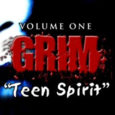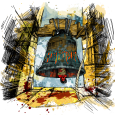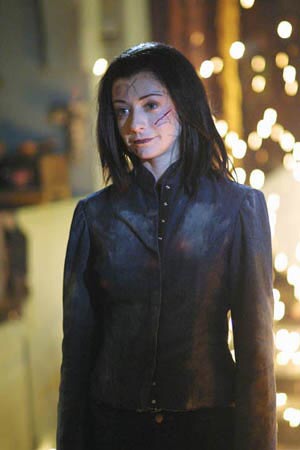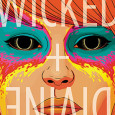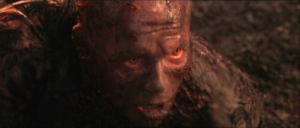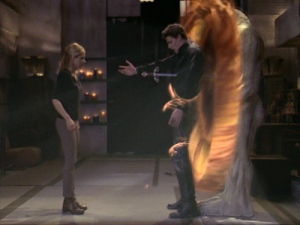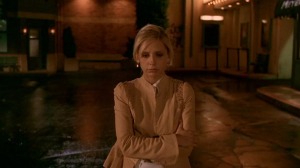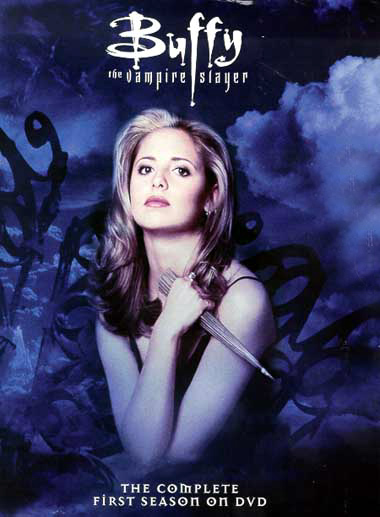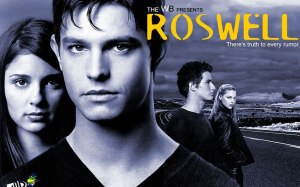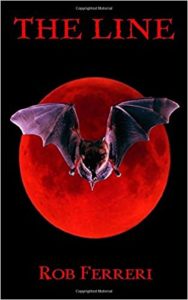 Vampires are a staple of Halloween and one of the most famous horror icons around. So I figured reading a vampire tale for Hallow-Reads was as good an idea as any. That’s when I was presented with The Line by Rob Ferreri, a self-published novel about a team of vampire hunters.
Vampires are a staple of Halloween and one of the most famous horror icons around. So I figured reading a vampire tale for Hallow-Reads was as good an idea as any. That’s when I was presented with The Line by Rob Ferreri, a self-published novel about a team of vampire hunters.
The Line tells the story of Alexander, an immortal ex-vampire and his mission to hide an ancient amulet from Dorian, his ex-master. When the amulet is discovered in present day New York, Alexander assembles a team to help him combat the vampire threat and protect the amulet. The team, which he dubs “the Line” are chosen ones, people who come from a long line of vampire slayers. The plot boils down to Buffy the Vampire Slayer meets The Avengers and works in many ways. However, there are quite a few ways that it just falls flat.
The book opens with a scene of our Alexander being healed of his vampirism and turning against his former brethren. It’s an interesting concept, one that doesn’t get explored often in pop culture, but it also doesn’t get explored much here, either. We know Alexander had a history as a vampire and worked with Dorian, but Ferreri never delves into that. There’s no back story showing us how Alexander became a vampire or what regrets he may have. We’re only told he was a vampire, isn’t any more, and now wants to rid the world of vampires.
The dialogue tags were the most tedious part of the book. Dialogue tags should be straightforward as the most effective ones are a simple “she said” or “he asked.” Sure, it’s great to mix them up a bit for some exclaiming, questioning, or accusing. But The Line makes them all as homogenous as possible. Every dialogue tag follows all of the dialogue. Every time. Now, this isn’t how most authors handle it; in scenes with two characters, for example, it’s generally easy to follow the flow of the dialogue, making the need for a tag each time unnecessary. But Ferreri uses them for every line and it gets very distracting.
From my understanding, The Line was originally written as a screenplay, and after reading it, that’s fairly obvious. The dialogue tags, for example, reminded me of slugs, the character name that precedes each line of dialogue, making it easy for the actor to know which lines are theirs and which belong to their costars. Sure, Ferreri punches up his dialogue with adverbs, but these are little more than parentheticals, the stage direction used to indicate how the actor should deliver the line.
This isn’t the only similarity The Line as a novel has to a screenplay. The book focuses a lot on the action; every few pages, a new action scene occurs. Whether it’s a showdown between the protagonists and the bad guys or some sort of training exercise, action scenes take precedence. Which makes sense considering The Line is a vampire based action adventure more than anything else. However, this focus detracts from any sort of character development, of which there is very little.
The Line is straight forward, to the point, and exactly what one could expect from a ninety minute action flick.
Does a novel need chapters of deep backstory to be enjoyable? No, not at all, but unlike movies, novels aren’t constrained by a certain length. There’s no hard and fast rule that a novel should be a set number of pages. In that sense, novels have an advantage over films when it comes to character development.
The Line implements a sort of ticking clock, yet another action movie trope. Alexander and Co must stop Dorian from getting the other half of the artifact before the next lunar eclipse or the world will suffer. Because of this, the plot moves at hyperspeed. Characters are introduced, destinies explained, trainings held, and lots of fight. There’s no time to get to know the cast. We see them put through the wringers of training a total of one time before they accept their fate. They trust each other implicitly after knowing each other for at most a couple of days. There’s very little internal conflict and it gets resolved in a page or two, which diminishes the stakes.
The parallel between The Line as a novel versus a screenplay makes sense when you look at author Rob Ferreri’s history. He’s worked on a few full-length feature films, most of which were made prior to the publication of The Line. He clearly has a strong grasp of writing, but it seems that scripting is a difficult habit to shake. Novels and screenplays are two different creatures and what works in one doesn’t necessarily work in the other. I don’t feel that his writing style is bad; just that it’s not the ideal approach for a novel.
Don’t get me wrong; there are quite a few good parts about The Line, most notably the character introductions. When we meet each of the characters, they get the spotlight in their own little vignette of a story. Detective Jay Hong is ambushed during one of the biggest cases of his career. The Blades brothers, Diego and Julian, are career criminals and we first see them during a high-octane car theft and eventual chase. Lena Somnianti is a sophisticated artist and fencer, a well-travelled and intelligent woman. They all make grand entrances, yet don’t really live up to their promise. Sure, they’re competent enough in their own right but none of them ever feel fleshed out besides what we learn at the outset.
This is really the fatal flaw of The Line. It never really lives up to its own story. It’s complete, has a plot and a diverse cast, but that’s the bare minimum when dealing with a novel. As a film, The Line would have been magnificent fun. More Underworld than Anne Rice, it didn’t quite fit into my idea of “horror” so it probably wasn’t the best entry for Hallow-Reads, but I still found myself engrossed in the tale as it unfolded.
The Line is available on Amazon. You can also see more of Ferreri’s work by visiting his comic publisher, Evil Kat Comix.
Grade: C
Don’t forget to try our Ten Family Friendly Halloween Movies to help lull the kiddos into a candy coma! Afterward, you can set the mood with Five Albums to Flesh Out Your Halloween Playlist and huddle under the covers with Netflix and Chilling – Halloween Movie Edition. Any other off-beat Halloween suggestions to throw our way? You can let us know on Twitter @SubCultured or come party like its 1599 in our Discord server!
It’s that time of year again! No, not Halloween (though that is sneaking up on us faster that I realize). I’m talking about New York Comic Con time! Though not as prolific as San Diego Comic Con, NYCC is the East Coast’s biggest comic and media convention, boasting hundreds of exhibitors and tens of thousands of attendees.
Just like its West Coast counterpart, NYCC attracts countless collectors and, as such, has become a haven for exclusive merchandise. This is where Funko comes in. Over the summer we showed you all of Funko’s SDCC exclusives, the Pop!s, Dorbz, Rides and Vnyls that were only available at the con. Luckily, they’re bringing a pretty strong game to New York Comic Con as well.
Since they’re revealing all of their exclusives in waves so make sure to check back often as we update to see everything you can expect to find at NYCC.
Fair Warning: if you are potentially triggered by discussions focusing on Old White Guy relationships, this may not be the article for you. Like Gandalf and Saruman (who was a nice guy in all those other Tolkien books that you haven’t read), for instance. Saruman was understandably jealous of the trail of happy, clapping halflings that I imagine trailed behind the Mithrandir everywhere he roamed. Theirs was a friendship doomed to fail, as are curiously many others that are loved and lost our most beloved books, movies, and shows. Hell, like most things, there’s even a whole page dedicated to the Evil Best Friend trope. Why is this trope so popular though? Just because it’s a guaranteed way to tug at our heart strings? Or is it because we relate and remember that our best friend in middle school became that bitch/bastard we hated in high school?
To examine these relationships further, let’s look at another common role: the Eccentric Mentor, here we have our grey and bearded Dumbledores and Obi-Wans. Something beyond facial hair they have in common? Former best friends that went to the dark side.
Wouldn’t it fuck you up to have to kill your friend? Worse, what would happen to the failed hero, when they realized they couldn’t quite defeat their frenemy and the world spiraled in to darkness because of it? You’d probably live in a cave and tell everyone you’re a wizard like Ben Kenobi, too. Our kooky mentors are always far more interesting when it is revealed that their dedication to guiding young heroes is driven by wanting to see their proteges succeed where they ultimately failed. The hero, then, must also take in to account that the big bad and symbol of all that is unholy, was also a person, friend, and child. This kind of humanization of both good and evil characters creates a way more relatable and heartrending conflict.
And when we finally get that long awaited Lion King direct-to-video prequel, I bet we find out that Rafiki was bros with the evil Koba from the most current round of Planet of the Apes movies. Of course the story doesn’t end there, or usually even start there. We first meet these characters as they attempt to take on the polarized conflict that arose out of their crumbling friendships by looking toward the next generation to succeed where they failed. Often the teams that they assemble are questionably young, but determined and righteous.
Is this fair? Wouldn’t it been nice for the world if Avatar Roku had handled his own best friend before he went all empire building and killed off all the poor dragons? Sure. Yes. Should have tried that out, Roku. But, story-wise, occasionally bestowing pearls of wisdom to the ragtag band of misfits divinely selected to clean up your mess is a far more interesting way to go. There’s a reason why season 3 of Buffy is the best season (couldn’t just talk about bros for an entire blog piece) and why by season 22 of the comics, we’ll see the disciples of the two best slayers duking it out while Buffy and Faith cheer from the sidelines. This trope naturally produces two stories and two sets of protagonists: the fall, in which worlds fall in the wake of the ruined friendship and the fix, in which a new crew is burdened with the mistakes of the past. This is the shit that gets Hollywood salivating at the prospect of turning trilogies into unnecessary quartets along with bonus prequels and origins swill.
The conflict then, is is more than just good versus evil, it’s about the next generation solving the problems caused by those before it, and often it’s done through unity and healing, rather than just straight forwardly chopping at evil with a sword/saber/wand. This type of story is different then and acknowledges that the Xavier’s of the fictional world didn’t just fail to stop evil, they failed to save a friend.
To properly mourn and appreciate, here’s a slide show of my favorite shattered friendships.
Kaitlyn D’Agostino
Staff Writer
I’ve spent a large portion of my life wanting to be Buffy Summers. While I have Faith Lehane’s tattoo emblazoned on my upper right arm, Buffy was my model. I know I’m not alone in this, I know a good deal of my generation grew up with the same goal: to someday be Buffy Summers.
What most people seem to remember about Buffy Summers: she wins a lot.
What most people seem to forget about Buffy Summers: she lost a lot.
Now, it’s not that people don’t remember these plot points, obviously they do. But they don’t seem to remember what loss means. What it can do to a person. They don’t remember that even as she is winning she is often losing. They forget that, because we are limited to an hour of Buffy each installment, we don’t see the full effect of the loss on her and those around her.
We don’t see Buffy really suffer because it’s not “good TV.” Genuine reality rarely is.
Buffy loses friends and allies and the mourning is brief. Buffy is forced to literally send the man she loves to Hell because, even if he’s good again now, he has been bad. He comes back and the problem is apparently solved (good TV), but Buffy’s pain over all of this is truncated. Buffy is nearly raped by someone she’s come to trust and the backlash against him is unbelievably portrayed (good TV?). Buffy dies, twice, and she comes back.
Real life for those of us who walk the path of Buffy does not have the convenience of “the network wants another season.” We have to live the fight in real time.
Maybe all you see from us is the equivalent of an hour a week. So when we cry or when we show pain, it’s unusual for you. Maybe it’s unbelievable. Strong women don’t DO that, Buffy cried in montages, why can’t you cry in montages?
We get told we’re “strong enough to handle this.” And we are. Trust me, we are. But even strong girls are defeated. Even strong girls hurt and cry and we need to be allowed to do it, no matter how uncomfortable that thought might make you. We need to suffer our losses, and we will.
This is our fight. Buffy never fought because she wanted to, in several cases she tries to stop fighting only to find out she can’t. Buffy fights because she has to. And we fight because there isn’t an alternative.
The dark things out there will always out number us. They will sometimes win. There will be cases where there is nothing we can really do, we don’t have the power to do it (Season 5 reminder: Buffy doesn’t kill the Big Bad that season. Giles has to do it for her because Buffy has limits imposed on her that he doesn’t). We can’t always just roundhouse kick the problem and pun and walk away. Not just because this is the real world, but because even within Buffy’s world that’s not always possible.
Allies are hugely important. But they’re ALLIES, they’re not directly in the fight, and sometimes they need to back off and let us fight. Sometimes they have to let us cry and be weak and not belittle the very, very real shit we live with every day. Xander was sometimes a total asshole and needed to shut his fucking mouth, okay? He was important, sure. However, while it was a fight he profited from, it WASN’T. HIS. FIGHT.
I have done my best to be Buffy Summers. Even in that I know I’ve failed. But I’ve learned as I’ve gone along, about my power, about power in general, that having power isn’t the same as being able to use it wisely, that it’s not about strength or weakness but about humanity and all the things that come with it.
I am strong. I know how to be strong. I have to keep fighting. Don’t you tell me what strength is.
In my hurry to write an article worth reading on this lazy Sunday, I received a text from my co-worker, on one of the few shows I recommended she watch: WB’s 1999 hit Roswell. Who hasn’t seen Roswell? Well, apparently, tons of people under 25.
When there isn’t a new episode of Doctor Who, Sherlock (hang in there!), Supernatural, Game of Thrones, Merlin (I’m so, so sorry), what are we to do? Sure, we can browse Tumblr until the sun comes up, literally, but let’s be real, we all want something new to obsess over. Where can we find completed/ended shows that will instill those feelings of angst, those heart aching moments of pure sadness? IN THE PAST, OF COURSE. Without further ado, here are three shows you can find to fill in your void (all puns intended).
3. Buffy the Vampire Slayer – I am almost pained to find out there are people who have not seen this. I keep in mind they are but young people, so it wasn’t part of their after school experience like it was for me. BTVS revolves around Buffy Summers, the latest in a line of young women known as “Vampire Slayers” or simply “Slayers.” Slayers are “called” to battle against vampires, demons, and other forces of darkness. Like earlier Slayers, Buffy is aided by a Watcher, who guides, teaches, and trains her. She encounters love (of a particularly forbidden nature) and loss throughout the show, and it’s one that will hopefully grow on you. Buffy has seven seasons and can be found in its entirety on Netflix. Its spin-off, Angel, is also available in its entirety for further viewing. If you’re a fan of Supernatural, this might be the best one for you to try.
2. Firefly – After Han Solo, yet before Captain Jack Harkness, there was another charming man with a gun/blaster who captained the Firefly-class ship, Serenity. While Malcom Reynolds and his crew of eight only get one season in which to invade our hearts, it’s a ride filled with every feeling imaginable. I can’t really talk much about it because I’ll start to feel my eyes tear up and yet again, shake my fist as I swear at invisible Fox Network executives. This show is also the only one on this list which has a nickname for its fans: Browncoats.
1. Roswell – Roswell is one of those shows that was far lesser known than big names like Buffy or Firefly, but for those of us who like the stomach churning agony of Doctor Who, you need not look further. Roswell is told from Liz’s point of view, a regular human girl who happens to live in Roswell, NM, where virtually nothing interesting happens until an argument between customers in her parents’ cafe gets ugly and Liz is shot. A classmate runs to her side and curiously heals her with his alien powers…I won’t say more than that, but I will warn you that there are only three seasons, so it’s a short watch, but will leave you yearning for more which will never come. This is where Colin Hanks and Katherine Heigl got their start, and main stars, Shiri Appleby and Jason Behr WILL become your OTP.
Hopefully, if you’re in a rut and browsing Netflix instant one night, you’ll try out one of these series and find something new to obsess and love! Maybe you’ll try all three and be like me. Or more likely, you’re rolling your eyes at my inherent fangirl and will try none.
Leia Calderon
@ladyvader99
Editor
ladyvader99@gmail.com


